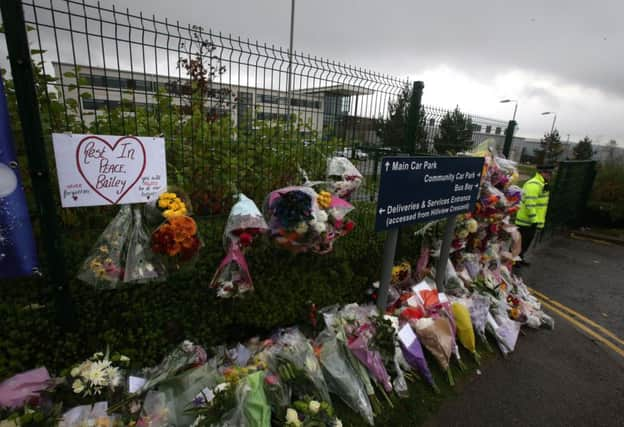Leaders: Siege mentality will harm education system


The death of 16-year-old Bailey Gwynne is a tremendous tragedy for his family and school friends – and our thoughts are with them – the loss of a young life with so much potential is a tragedy for us all.
It is heartwarming to see the way the local community has rallied round to support those close to Bailey in their time of need in the days and hours after the Aberdeen schoolboy’s death following a stabbing incident in the canteen at Cults Academy. The community is in mourning.
Advertisement
Hide AdAdvertisement
Hide AdThe incident has rightly reopened a debate into the issue of school security. Obviously, every parents’s belief in their children being safe at school is of paramount importance. No mother or father wants to – or should – spend their time away from their child worrying that, like Bailey, he might not come home that night.
But we should remember and be thankful that such incidents are rare. We have all seen images from America of armed police and metal detectors at the entrance of every school and we have to be aware of just how implementing similar measures would irrevocably change the school experience for children in Scotland.
Schools need to be an inviting and rewarding place for children to be as well as a secure place where they can learn.
Feeling like they are entering a high-security prison every time they walk through the doors of their place of learning is counter to that feeling of belonging,
On this side of the Atlantic, it has been argued that policing such metal detectors would be impossible – meaning schools could have to employ private security forces to police a school’s doors.
In America, teachers are made to rehearse drills with children as young as nursery age, as to what they would do if a gunman entered the school.
The effect of this climate of fear is terrifying for children and teenagers.
For those directly involved in these kinds of incidents – which usually in the UK, involve knives rather than guns – it is understandable that they want action to be taken.
Advertisement
Hide AdAdvertisement
Hide AdTeacher Vincent Uzomah, who was stabbed by a pupil in June this year at a school in England, has spoken out saying that he believes metal detectors would act as a “deterrent” for people trying to smuggle weapons into school.
For Mr Uzomah, who was injured in an unprovoked attack while in his place of work, preventing that from happening to anyone else is obviously foremost in his mind.
But high-level security at school gates cannot be the only answer.
Former Metropolitan Police chief Sue Hill yesterday urged parents to talk to their children and explain to them the consequences of carrying knives in a bid to deter other children from becoming involved in violent situations at school.
We need to increase education surrounding violence, find funding to send community police officers to speak to pupils in schools. We need to educate youngsters in alternative methods of conflict resolution, we need to encourage teachers so any upcoming potential flashpoint is addressed and examined, even more than they do now. But making schools fortresses would deeply alter the spirit of learning in our schools and must be approached with caution.
Chilcot delays hard to accept
By the time the Chilcot report into the Iraq war comes out, it will be 13 years since Britain went to war in the Middle East.
The two-million word report, compiled by a team headed by Sir John Chilcot, will consider Britain’s involvement in Iraq between mid-2001 and July 2009.
Sir John has said the document will be ready for “national security checking” and preparation for publication by mid-April 2016 – seven years after the first hearings of the inquiry took place.
Advertisement
Hide AdAdvertisement
Hide AdBut its long-awaited publication may not result in the resolution that politicians and relatives of those killed in the controversial conflict have been hoping for.
Yes, it is right to pursue people who made decisions that resulted in such a loss of life and global change, but the fact is that these delays have probably meant that no-one will be called to account and no meaningful lessons will be learnt.
Prime Minister David Cameron has described the hold-ups as “frustrating”, while Sir John has blamed a lengthy dispute with the Civil Service over the declassification of official documents as well as a need to give individuals facing criticism the chance to respond through the so-called “Maxwellisation” process for the delays.
Some of the delays have been understandable: the report needed to avoid an inadvertent breach of national security, or of Article 2 of the European Convention on Human Rights, the right to life.
But it has still taken far too long.
And those frustrated by the time it has taken for the report to come out, understandably, want heads to roll. However, in reality, any inquiry into how those delays came about would be simply more time wasted, hard though that is for those concerned to take.